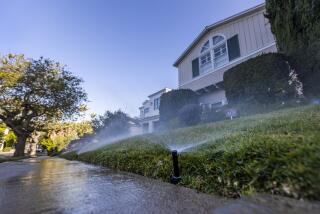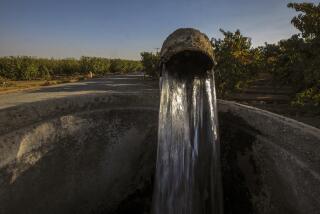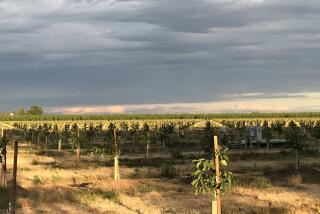Column: DWP should follow Bay Area utility’s lead and out its water hogs
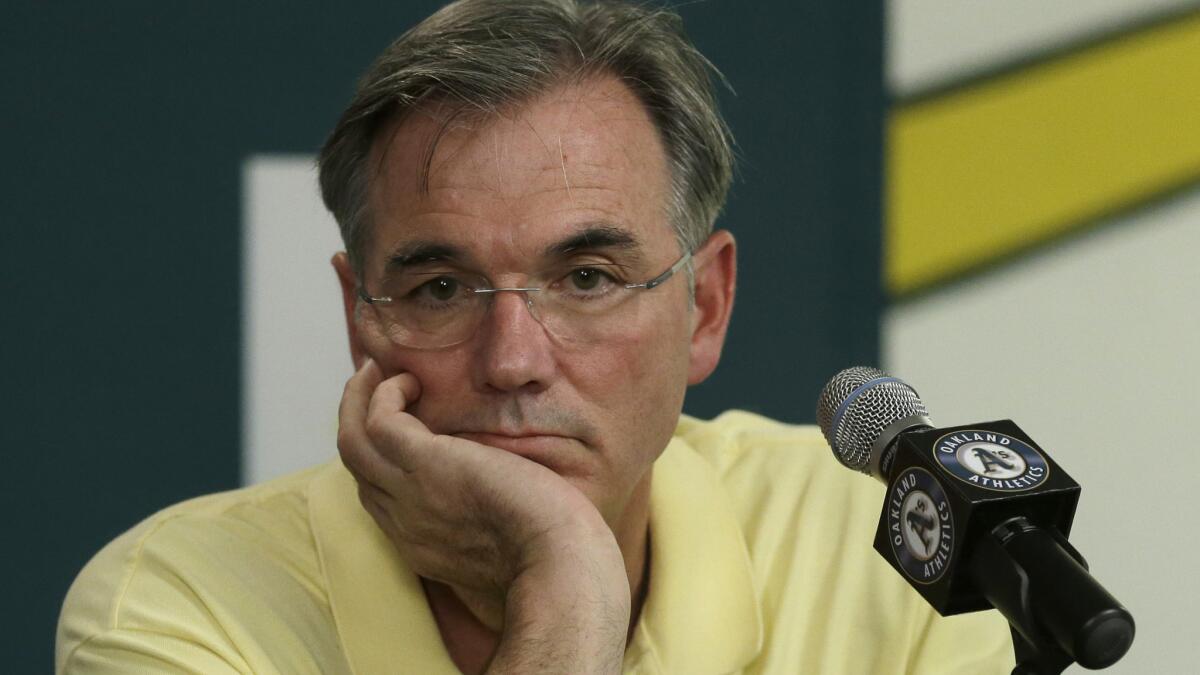
Oakland Athletics General Manager Billy Beane was the East Bay water glutton who grabbed the most headlines last week. He was using almost 6,000 gallons daily.
In Los Angeles, we don’t know who our biggest residential water hogs are. They’re able to hide behind the walls of their estates in Bel-Air and beyond, and pump as much as 1,300 gallons of water hourly. They’ve even got protection from the Los Angeles Department of Water and Power.
But up north, they do things differently.
Last week, the East Bay Municipal Utility District released the names of some of its most prodigious water-pumping champions, all of whom are being fined for missing the memo on California’s punishing drought.
Topping the list was former Chevron executive George Kirkland, whose daily water use was 12,587 gallons. Right behind him, at 8,090 gallons a day, was venture capitalist Mark Pine.
But the East Bay glutton who grabbed the most headlines was Billy “Moneyball” Beane, architect of the Oakland A’s’ cost-cutting approach to baseball. When it comes to buying water, it’s Billy “Moneybags” Beane. He was guzzling almost 6,000 gallons daily, and like the other two guys atop the list, keeping his estate a lovely shade of green in the bone-dry San Ramon Valley.
Beane, by the way, blamed his high numbers on leaks in his irrigation and swimming pool. He said he was embarrassed and plans to take immediate action.
So how come EBMUD released names, even as the DWP refuses to?
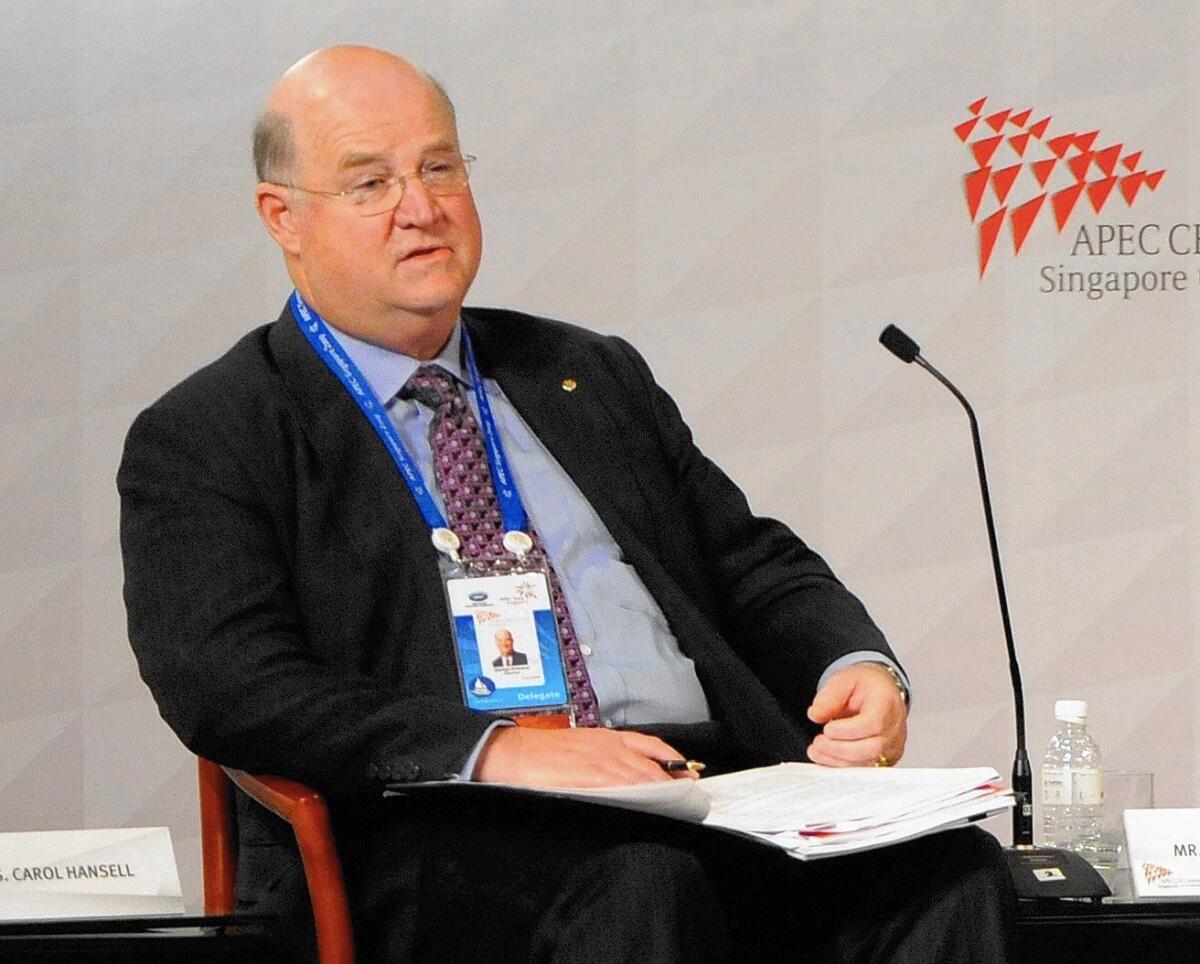
Former Chevron executive George Kirkland topped the East Bay Municipal Utility District’s list of its water-pumping champions. His daily water use was 12,587 gallons.
The difference is that six months ago, EBMUD’s board voted 6 to 1 to establish an excessive water use ordinance. Customers pay higher rates with greater usage and are fined if they use more than 1,000 gallons daily. When Bay Area media outlets requested those records, the utility was legally obligated to provide names of culprits.
“We structured this penalty to ensure that water hogs are held responsible during this drought emergency,” EBMUD board member Andy Katz told me, saying that customers have demanded equity in terms of shared sacrifice.
There was a time in California when you didn’t need such an ordinance. The information was easy to come by, as evidenced by this 1991 Los Angeles Times report:
“San Diego’s fifth full year of drought brings more than just the prospect of brown lawns and short showers. It also spawns a subtle notoriety for the city’s largest residential water users,” the story began.
“While the average household uses 349 gallons of water per day, the Top 100 users — a virtual Who’s Who of San Diego — consume 3,000 to 10,000 gallons daily, records show.”
Topping the list was Helen Copley, then publisher of the San Diego Union-Tribune, who pumped 10,203 gallons daily at her La Jolla manse.
Confronted with the news, Copley suffered no bout of conscience.
“I don’t doubt for one minute that I might be the biggest user,” she quipped. “How many people have 91/2 acres?”
But transparency took a hit in 1997 when Silicon Valley tech execs fought to protect their precious privacy. A Palo Alto legislator carried a bill that allowed utilities to keep their customers’ power and water use secret, arguing that the release of names and addresses posed a safety risk.

Steve Lopez looks for the biggest residential water hog in California -- a home in Bel-Air that used 11.8 million gallons of water last year.
So here we are in a peculiar time. Roadway medians are dry, parks are dying of thirst, and not only are people of modest means losing investments in backyard greenery, but they can be cited and publicly outed for running a hose on the wrong day. Meanwhile, California’s citizen of the year is using 1,300 gallons of water an hour in Bel-Air and remains anonymous.
Did you catch that number? EBMUD is fining residential customers (the highest levy so far was $1,800) for using more than 1,000 gallons a day, and a homeowner in Bel-Air is using 1,300 gallons an hour.
In fact, Bel-Air has 19 customers using more than 7,600 gallons a day, and Beverly Hills has 32. That’s according to figures DWP shared with me after a records request by the Center for Investigative Reporting, which broke the news that Bel-Air has four of the top five water users in the state. (The DWP provided information only by ZIP Codes, without names or addresses.)
Seems to me that if you’re using 7,600 gallons of water a day, there’s a good chance you’re already in violation of the DWP’s water use restrictions.
You can run the sprinklers only three times a week for eight to 15 minutes, depending on whether you’ve got a low-flow nozzle. So if you’re in compliance on sprinklers but still using 7,600 gallons a day, it means you’re flushing 20 toilets every three seconds, running a fracking operation or filling the pond for a herd of elephants.
So how hard can it be for DWP to check the records, knock on doors, cite the gluttons and call the news conference?
Two more questions while I’m at it:
Why haven’t LADWP commissioners followed the EBMUD model, and why hasn’t L.A. Mayor Eric Garcetti demanded nothing less? So far we’ve heard only from Councilman Paul Koretz, who asked the DWP to look into financial penalties, usage caps and possible service shut-offs for violators.
“I definitely believe in stiff penalties,” DWP commission President Mel Levine told me, and he said he would support the release of names after violators are notified.
Garcetti said he was in favor of naming names too.
Well, has the mayor communicated that to Levine?
No, Garcetti said, but he told DWP General Manager Marcie Edwards.
Garcetti and Levine said they’re both in favor of additional pricing tiers, with big users paying more per gallon. But they’re proceeding cautiously because of a court ruling that San Juan Capistrano’s tiered structure was out of compliance with a 1996 voter-approved ordinance on water rates.
Garcetti and Levine said Los Angeles residents have made the sacrifice, reducing water consumption more than 17%.
Indeed we have.
Now let’s get tough with the high and mighty, enjoying the verdant splendor in the conscience-free zone.
Twitter: @LATstevelopez
More to Read
Start your day right
Sign up for Essential California for news, features and recommendations from the L.A. Times and beyond in your inbox six days a week.
You may occasionally receive promotional content from the Los Angeles Times.

